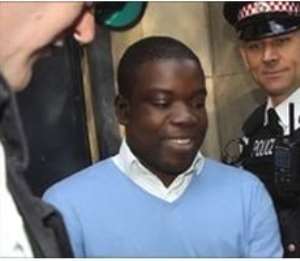
The former UBS banker who served jail time for losing 2.3 billion dollars of his company’s funds in “unauthorized trades” in 2011, Kweku Adoboli says he never described deportation to his home country, Ghana as being worse than jail in the UK.
The 38-year-old Ghanaian who otherwise has enjoyed sympathy over his incarceration by the UK authorities, came in for quite some bashing after some media outlets reported he preferred being jailed in the UK to deportation to Ghana.
Mr. Adoboli who is currently being detained at Harmondsworth Immigration Removal Center, near Heathrow where he is fighting a deportation order, says he was completely misquoted and that he never said those words attributed to him.
He told JoyNews Editor, Israel Laryea, who paid him a visit at the detention center, that the publication was culled from an interview he had granted the BBC in which he said banishment is a punishment much worse than being in prison.
Indeed beyond the headline, Israel says, the article in which he is said to have made those remarks quotes him as saying, “I’ve served my time, but I’m being given an extra punishment – a banishment – and just because I didn’t get around to becoming a citizen. This punishment is so much worse than being in prison.”
Mr. Adoboli was due to have been deported to Ghana on Tuesday, but for a last-minute reprieve after a judge awarded an injunction against his removal pending a Judicial Review into his case.
Israel Laryea describes seeing Kweku, crest-fallen and dejected as he was allowed into the visitor area at the detention center - more like a prison - nothing like the high-achiever who used to rake in billions of pounds sterling for his former employer, UBS.
Israel also got to meet Kweku’s girlfriend who had come to see him at the detention center.
Asked why he never applied for British citizenship for the over two decades that he schooled and eventually worked there, Kweku explained that UBS' immigration lawyers advised him to pursue the work permit route even though he was eligible for naturalization as long ago as 2002.
In 2009, required to travel for his employer at short notice, he says he was unable to submit his Ghana passport for UK citizenship due to the usual delays at the UK passport office, sometimes for as long as nine months.
The pressures of managing a $50bln book with just one other employee did not abate before the loss of 2011. Kweku also said he did not think that it would have made a difference, explaining that he took responsibility because of his Ghanaian upbringing, which taught him to accept responsibility for his actions and inactions, no matter the consequences.
Under UK law, foreign nationals sentenced to more than four years in jail are to be deported to their home countries “unless there are very compelling circumstances”.
Mr. Adoboli says though he loves being a Ghanaian, he’s grown up to know many friends and associates in the UK and so can’t just let go like that “at the drop of a hat”. He says it will be a violent act if one part of his identity is destroyed and he is made to choose between being a Ghanaian and being resident in Britain.
Kweku, however, finds himself in quite a lurch, because, much as he would want to cling to his roots as Ghanaian, he is faced with a situation where the more he tries to show the strength of his ties to the UK, the more others believe he is trying to disown Ghana. This is not the case, he says. His fight has nothing to do with his feelings for Ghana and everything to do with protecting relationships built over 26 years since childhood in the UK.
He, however, argues that it will be important to maintain his right to live in the UK, as once he is “banished” from the UK, he will lose virtually any chance of being admitted into another western country. This, he says, would destroy his value to both Ghana and the UK amidst efforts to use his rich banking experience to bear on the development of his native Ghana and the relationship between both countries.
He is adamant his deportation is a disrespect of what should be a relationship of mutual respect between equal Commonwealth partners.




 We’ll no longer tolerate your empty, unwarranted attacks – TUC blasts Prof Adei
We’ll no longer tolerate your empty, unwarranted attacks – TUC blasts Prof Adei
 Bawumia donates GHc200,000 to support Madina fire victims
Bawumia donates GHc200,000 to support Madina fire victims
 IMF to disburse US$360million third tranche to Ghana without creditors MoU
IMF to disburse US$360million third tranche to Ghana without creditors MoU
 Truck owner share insights into train collision incident
Truck owner share insights into train collision incident
 Paramount chief of Bassare Traditional Area passes on
Paramount chief of Bassare Traditional Area passes on
 Two teachers in court over alleged illegal possession of BECE papers
Two teachers in court over alleged illegal possession of BECE papers
 Sunyani: Victim allegedly shot by traditional warriors appeals for justice
Sunyani: Victim allegedly shot by traditional warriors appeals for justice
 Mahama vows to scrap teacher licensure exams, review Free SHS policy
Mahama vows to scrap teacher licensure exams, review Free SHS policy
 Government will replace burnt Madina shops with a new three-story, 120-store fac...
Government will replace burnt Madina shops with a new three-story, 120-store fac...
